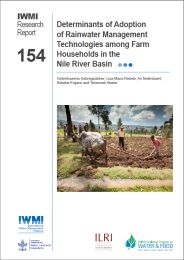Determinants of Adoption of Rainwater Management Technologies among Farm Households in the Nile River Basin.
Citation:
Gebregziabher, G.; Rebelo, L-M.; Notenbaert, A.; Ergano, K.; Abebe, Y. 2013. Determinants of adoption of rainwater management technologies among farm households in the Nile River Basin. Colombo, Sri Lanka: International Water Management Institute (IWMI). 34p. (IWMI Research Report 154). [doi: 10.5337/2013.218]
Abstract
Agriculture is the main sector of the Ethiopian economy. Uneven distribution of rainfall, droughts and high rainfall intensities contribute to low agricultural productivity and high levels of food insecurity. High population growth, the cultivation of steep and marginal lands, poor land management practices and lack of effective rainwater management (RWM) strategies aggravate the situation. Studies show that the adoption of RWM technologies is low and is influenced by several factors. This study assesses the patterns and the factors that influence farm household adoption of RWM technologies. Unlike previous studies which typically examined a single technology rather than the interdependence between technologies, the conceptual framework of this study is based on the premise that farmers are more likely to adopt a combination of promising RWM technologies. The need to consider this interdependence is one of the many recommendations made by this study to promote the adoption of RWM technologies.
ISBN 978-92-9090-781-7


